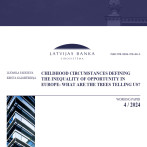Goods exports are navigating through challenging times, the current account remains in deficit
In the third quarter of this year, the current account of Latvia's balance of payments registered a deficit of 558 million euro, i.e. 5.3% of the gross domestic product (GDP). Although the deficit slightly exceeds that seen in the first quarter of this year, it is, however, below the levels reached in 2021 and 2022 (both in millions of euro and vis-à-vis GDP). The current account deficit stood at 1.4 billion euro, i.e. 4.8% of GDP, during the nine months of this year.
European economies face a slowdown – the high interest rates have resulted in a standstill of the real estate and construction sectors and in reduced consumption. For Latvia's exporters, this means weaker external demand and also lower prices for a range of goods playing a crucial role in Latvia's exports. Despite the fact that prices have stabilised after a more lasting decrease, the current development of major trade partners is not optimistic.
Europe's economic adversities continue affecting goods exports
The value of goods exports has declined considerably compared with the previous year; however, it should be noted that the last year saw a spectacular increase in exports value. Thus, the current situation rather than the year 2022 should be considered closer to normality. This year, prices of various groups of export goods important for Latvia are significantly lower, for example, those of grain whose harvest was smaller this year compared with the last year's record-high harvest, and also those of wood for which demand has tumbled in major trade partners (for example, in Scandinavia). Likewise, the energy price has drifted downwards substantially, decreasing the value of exported mineral products (for example, electricity and natural gas). However, exports of some goods, for instance, alcohol and textiles, have even somewhat picked up.
Energy imports are significantly lower following the buoyant upswing in goods imports
The value of goods imports has dropped at a slower pace vis-à-vis exports; however, the fall has exceeded 20% in annual terms. The main contributors to this decrease are mineral products: oil products, natural gas and electricity whose imports have been a third less than last year. Account should be taken of the fact that uncertainty was considerably greater a year ago, and prices reached record highs. Overall, although less markedly, the value of imports of other goods has also edged down: wood imports have tumbled by one-quarter but imports of articles of plastics – by one-fifth. Imports of vehicles and food have been more resilient.
Tourism – more active but other services – weaker
Foreign tourist activity has been slightly more pronounced in trade in services, and this year's tourist season in Latvia has been better than in 2022. Thus, air transport business also runs better vis-à-vis road transport, which is more linked with trade in goods and whose performance in the third quarter was weaker than in the first half of this year. The value of telecommunication, computer and other business services, which have lately driven growth of services exports, has been similar to that of the previous year, also pointing to a slowdown in the provision of modern services, not just the traditional ones. Services imports also show similar trends, thus the turnover of trade in services has been approximately the same as a year ago.
Foreign direct investments remain strong
Inflows of foreign direct investments reached 4.6% of GDP in the third quarter and were mainly targeted at professional, scientific and technical services, financial activities, trade and manufacturing. On the back of ongoing outflows of Russia's investments, investments by other countries significantly exceed the removed investments, suggesting that the attractiveness of Latvia has not decreased in the eyes of foreign investors in these difficult times either.
Textual error
«… …»






